Inside Quakertown's Bush House Hotel: Former residents detail years of ignored complaints
After moving into his room at the Bush House Hotel in 2020, Austin Gonzalez quickly found out that he could turn on the window air-conditioner or the television, but not both.
“You couldn’t plug in two things at the same time,” said Gonzalez, a 23-year-old construction worker who rented a room for 17 months at the Quakertown boarding house.
His situation was pretty standard at the 101-room former hotel built in 1850, former residents said.
Quakertown officials condemned the property in November, deeming it unsafe for anyone to live there. Since then, this news organization interviewed nearly a dozen former residents about conditions inside the hotel. All shared stories of living with fear, frustration and filth.
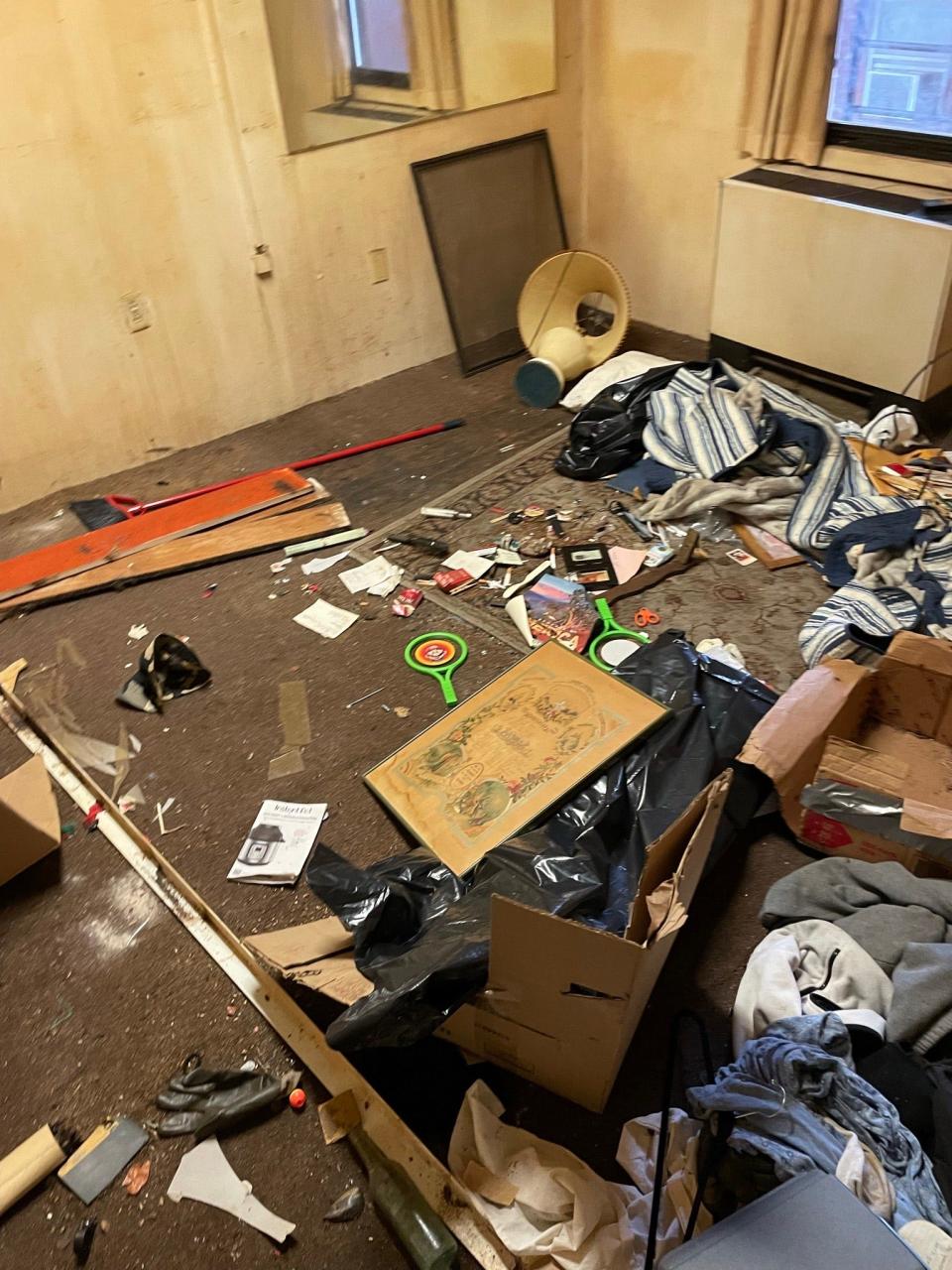
Among them:
An older resident was injured in a fall after she tripped walking down the stairs, grabbed the handrail and it tore out of the wall. It had been secured only to the drywall.
Residents who used the communal bathrooms on the second and third floors had to supply their own toilet paper. Some left their trash in the hallways rather than drag it downstairs to the trash bin behind the building.
An open-door rental policy attracted people with more personal baggage than belongings, residents said. Loud music and arguments were a constant presence — like the bug infestations that got so bad it led to the building's condemnation.
There was no smoking allowed in rooms, but most ignored it, residents said.
On the coldest nights, homeless people wandered into the lobby to sleep on couches or inside closets.
Craig Bennett slept on the lobby couches when he couldn’t take the bed bugs in his room.
“If you don’t mind roaches and bed bugs and the power going out every now and then and problems with the plumbing, it's an OK place,” Bennett said.
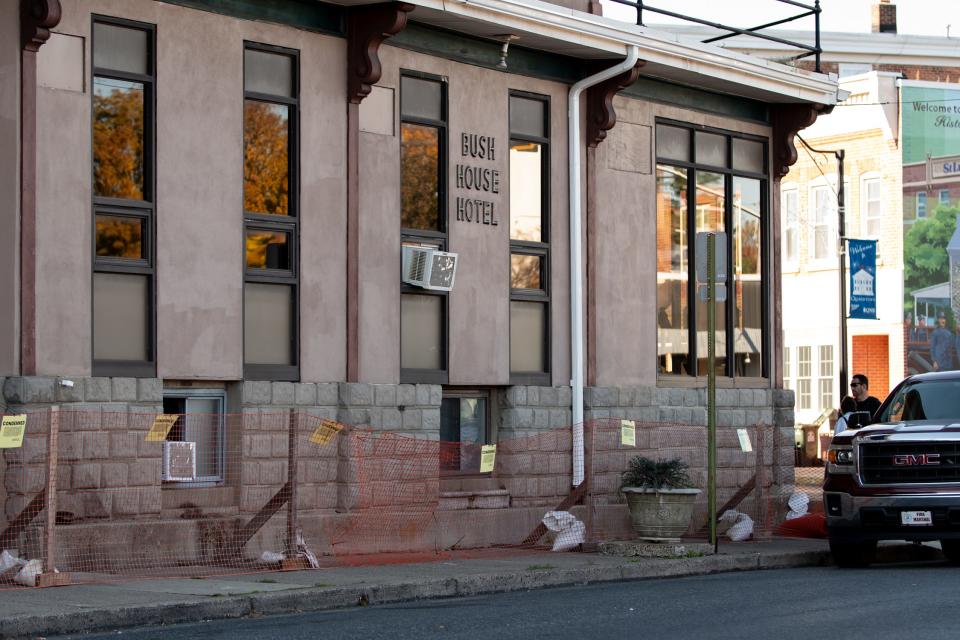
Those who complained too much about the broken appliances, unexplained power outages and defective fire alarms said they were answered with eviction threats.
For the most part, though, residents tolerated the conditions as long as possible. The rent was less than half what other landlords charged, they said, topping out at $250 a week including utilities.
The Bush House Hotel owner, Realtor Thomas Skiffington, has disputed allegations that his property is unfit for human occupancy, and in court documents has accused officials of lying about conditions there to force him to sell.
Skiffington's real estate investment company, MT Estate Realty, says it invested more than $750,000 in property improvements over the last three years, and company-hired electricians found no evidence of insect infestation or a malfunctioning electrical system, as the borough has alleged.
But former residents offered a vastly different view of life inside 200 West Broad Street.
'We were being eaten alive': Lawsuits allege 'dangerous' living conditions at Bush House long before condemnation
Bush House Hotel owner: Quakertown condemnation done to force sale, remove poor tenants
Inside Room 111
Ron Salamanca, a 65-year-old Vietnam War veteran, and his girlfriend, Christine Hendricks, 50, live off his Social Security income and what she earns working at a Quakertown gas station.
They lived at the Bush House for a little over a year, and had been looking forward to moving into a two-bedroom apartment in an adjoining building MT Estate Realty owns, Hendricks said.
But that property was among two accessory buildings also condemned on Nov. 10.
At the Bush House, the couple paid $190 a week for a large, bedroom-size room on the first floor. It came with a microwave, small refrigerator and a bed, TV and dresser. They added a hotplate and convection toaster oven.
The room also had a private bathroom with shower, a rare luxury in the building. Most tenants living in the second- and third-floor rooms had to share bathrooms. There was one on the second floor and two on the third, Salamanca said.
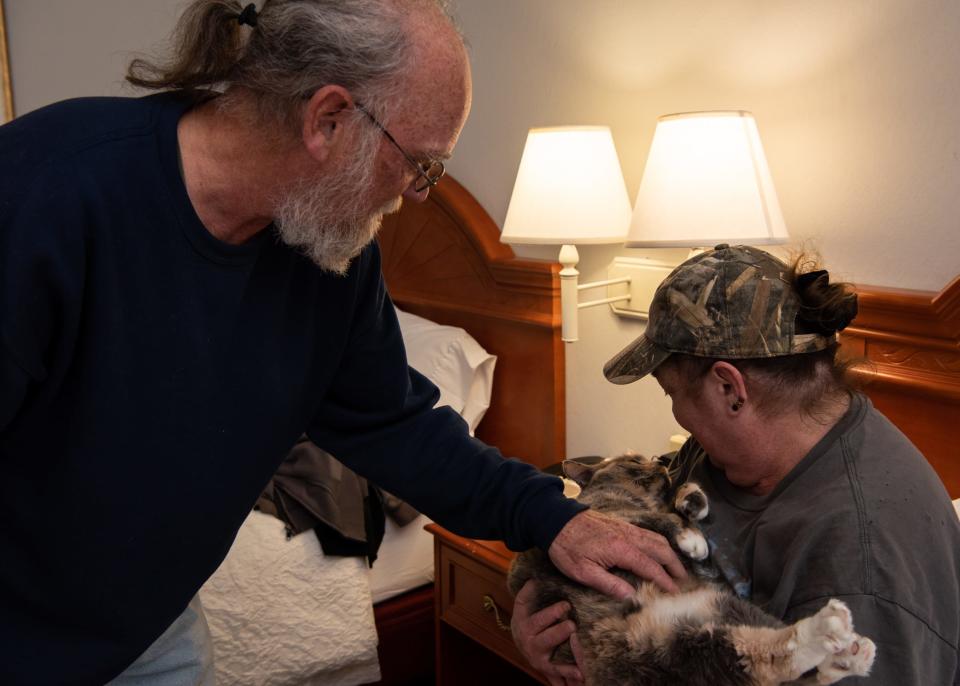
When the couple first moved in, nothing stood out as wrong with the room, Salamanca said, other than the rugs could have used a shampooing.
Salamanca said that he didn’t notice bugs initially, but that soon changed.
First, it was German cockroaches. No matter how many cans of bug spray they used, they kept returning. Around this time last year, the bed bugs started getting out of control.
“By the millions," Salamanca said. “I’m telling you.”
The couple brought their pest complaints to property manager Christian Skiffington, Tom Skiffington’s son, but when nothing was done, they didn’t pursue it further.
“We didn’t want to make waves,” Salamanca said. “It was the cheapest place we could find to live.”
Bugs were not the only problems that Hendricks said she experienced during a previous stay at the hotel.
Two burners on a stove in her room didn’t work properly. She complained, but it wasn't fixed.
Hendricks said that she eventually was evicted. Six months later, a fire started in her old room that heavily damaged part of the hotel.
Investigators ruled its cause as undetermined, but traced an electrical malfunction with a surge protector being used by the 82-year-old tenant who moved in after Hendricks.
The woman, Marcella Heitz, died of smoke inhalation.
Recently, Hendricks said, she noticed Christian Skiffington doing renovations around the building. He renovated one room, installing new flooring, molding, a new sink and toilet and assembling new furniture, she said.
Hendricks added that she often saw Christian making repairs around the building.
“Not once did I see Tom Skiffington in there doing anything himself,” she said.
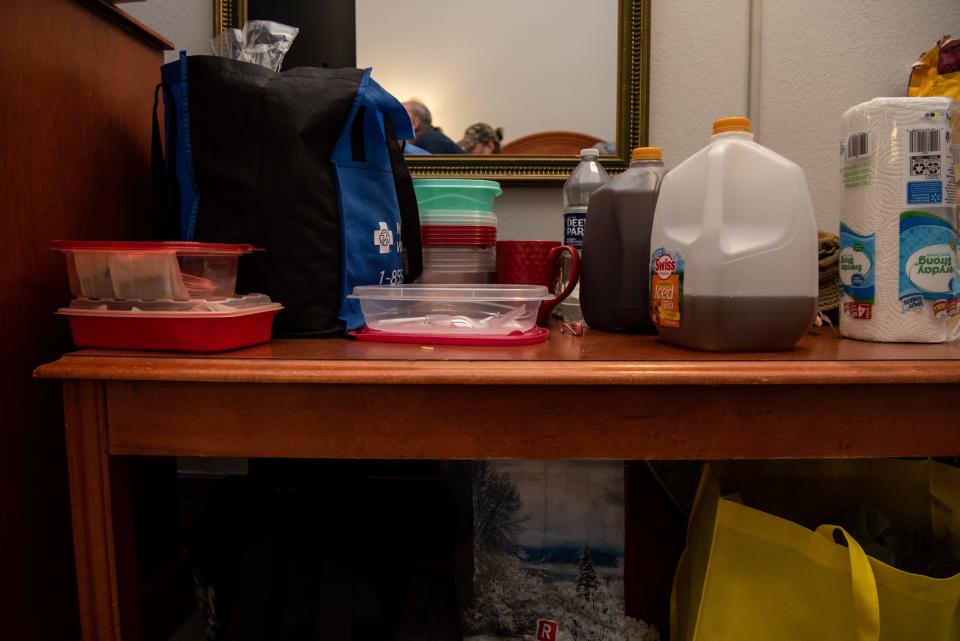
Skiffington has not responded to repeated requests for comment.
For now, Salamanca and Hendricks are staying in two-week stretches at local hotels arranged through a county social service agency, which is covering the bills for displaced residents. The agencies are working to find former residents new homes in a housing market where demand outstrips supply, leaving low-income people largely out of luck.
The Quakertown motel they’re staying in now is cleaner than the Bush House, though Hendricks said she found evidence of mold in the room and hallways. There is a refrigerator, two queen beds, microwave, dresser, desk, table and flat screen TV.
Still, the new hotel doesn’t feel like a home, Hendricks said.
She can’t cook there and the couple’s dietary restrictions prevent them from eating donated meals. The hotel is five miles from her job, so she is spending money she can’t afford on rides, where before she walked to work.
Would she consider moving back to Bush House? Hendricks didn't hesitate with an answer.
“I would rather find someplace else and call it home. I don’t want this happening again two years down the road.”
Bush House Hotel history: Quakertown officials knew of Bush House problems for years. What was done?
More from Bush House residents: Removed from Bush House Hotel, residents struggle: 'I don't know where I'm supposed to go'
The hotel homeless: Bucks County's hotel homeless living on the edge, but say its better than the streets. Here's a look inside
'Stay away, stay away'
Scott Eck lived at the Bush House on and off for more than 15 years. He most recently returned two years ago.
“I like the area and I just knew something would be there,” said Eck, who is 57.
The only other low-cost motel has a weekly rent nearly twice as much as the $195-plus tax he paid for Room 317. An apartment was out of the question, when he figured in first and last month's rent and security deposit.
Bugs were an ongoing problem, he said.
“I’d wake up with friends in bed with me,” he said. “Not the kind of friends I want.”
On the worst nights, he’d lie in bed shooting bug spray at cockroaches on the ceiling.
“I was told I was in the top three cleanest rooms,” he added.
Electrical problems were common, he said. Too many devices plugged into an outlet easily overloaded breakers and cut power.
Heat was included in the weekly rent, but it didn’t always work. Eck also said he ended up buying a new window air-conditioner because, as he put it, the one in his room was useless.
Recently, Eck noticed some improvements around the building, but it was all cosmetic work, he said.
A few months ago, Eck said, someone forced their way into his room and stole more than $1,000 he hid in his top dresser drawer. He found the door to his room kicked in when he returned for the first time since the condemnation to collect more personal belongings, he said.
Someone rifled through his belongings and stole a pill bottle filled with quarters he used for the laundry, and a big bottle of dish detergent, he said.
For the moment, Eck said he is making do looking for work. He is staying in an Allentown hotel, but he doesn’t know how long the county social service group will keep paying the bill.
He lost his concrete and construction job during the pandemic and gets by picking up odd jobs to pay for living expenses, Eck said.
“I’m just about broke," he said. "I live day-to-day.”
But Eck said that he has no plans to return to Bush House barring major improvements.
“That place needs to be bulldozed down to the ground,” he said. “Stay away. Stay away. All (the owners) are worried about is their bank account.”
'It was putrid'
The smell inside Bush House is not easy to describe, but it almost sticks to your skin, residents said.
Some said it was something you'd smell in a rarely visited windowless basement on an August afternoon. Others offered up combinations of stale cigarettes, sewage gas, soiled diapers, old books and rotting meat.
“Everywhere smelled,” said Meagan Bennett. “It wasn’t just an old smell, or a mold smell, there was another layer to it. I’m serious. It was putrid, though.”
Bennett's 70-year-old father, Craig, called the hotel home for five or six years. He had followed his late twin brother, who rented a third-floor room at Bush House.
Back then, the conditions weren’t horrible, Craig Bennett said. The room came furnished, and most important, it was affordable, he said. Two maids cleaned the three floors. Before it was condemned, there was only one left, he said.
After a year, the exhaust fan in Bennett's bathroom stopped working. He bought a new exhaust fan, but the property manager refused to put it in, he said.
He ended up replacing two of the outlets in the bathroom to water-safe GFI ones. He salvaged parts from the trash to fix the window in his room.
“I only had heat because I fixed it myself,” he said.
After the 2018 fire, the landlord had fans running for weeks to get rid of the burnt smell. Eventually, a new tile floor was installed in the lobby among other renovations, Bennett said.
The doors on the first floor rooms were replaced with solid wood ones. The property manager’s office was renovated. New windows were installed on the side of the building facing West Broad Street.
“That is about as far as he got,” Bennett said. “He never did anything about the burned out part.”
One thing that continued to be an issue was the fire alarm system. It would sound three times a month, sometimes in the middle of the night, once during a snowstorm. The alarm went off so often people stopped leaving their rooms, Bennett said.
The bug problem, which was once annoying, became intolerable over the last year, he said.
He found cockroaches in the refrigerator. Dead roaches blocked the digital timer on the microwave and clogged up the coils on the heater. The bed bugs drove him to sleep on the lobby couches several nights a week.
“I couldn’t take it anymore,” he said. “I never lived like that in my life.”
Bennett said that he thought about leaving, but where would he go? No place charged anything close to the $900 a month he paid.
In August, Bennett said he was was evicted after the landlord accused him of setting off a false fire alarm. With no lease, Bennett stuffed what he could in a backpack and left.
He had to leave his clothes behind because they were infected with bed bugs, he said.
For a few weeks he lived on the streets, sleeping where he could find a bunch of bushes to hide in, Bennett said.
His daughter found him sitting on a park bench after she flew out from her home in Texas to see him when she was unable to get him on the phone.
She had first stopped at his room at the hotel but didn’t find him. What she found instead prompted her to pull out her cellphone to take photos and video.
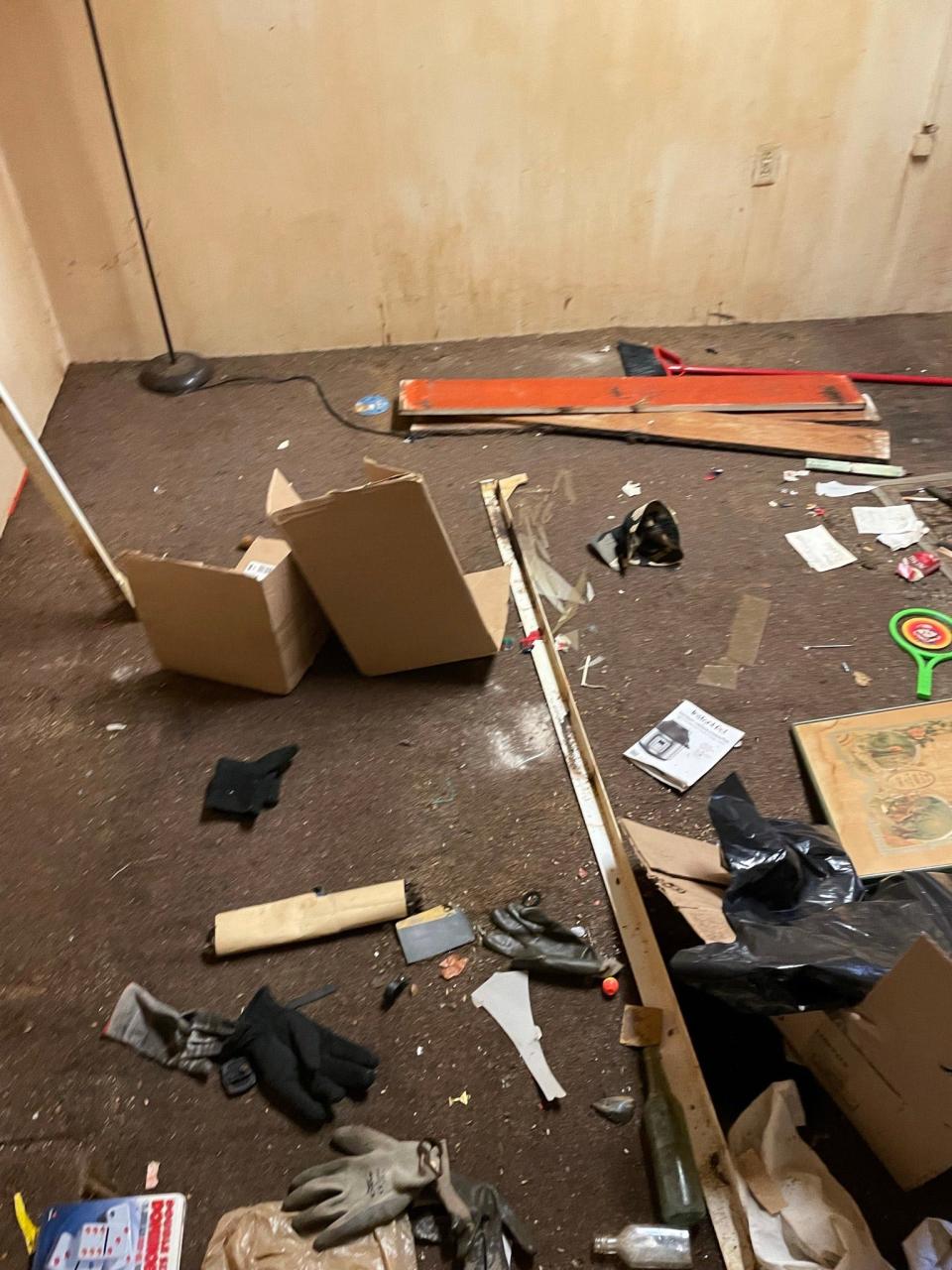
The room appeared ransacked, with discarded trash everywhere. The carpet was so filthy its color was unknown. The walls were nicotine-stained.
When she stepped into the room wearing her flip-flops, Meagan immediately felt stings. She stayed in the room no more than 15 minutes, she said.
“I was so scared to touch anything,” she said. “My feet had bites on them for weeks.”
Four months after his eviction, Bennett is still homeless.
He currently lives at another Quakertown motel. At $350 a week, it's the cheapest place nearby they could find, Meagan Bennett said.
“He is an old man who needs a place to stay. He doesn’t need much,” she said. “I mean, he lived in the Bush motel.”
Staff writer James McGinnis contributed to this story.
Click here to sign up for our Watchdog Newsletter and receive bi-weekly updates on our watchdog journalism.
This article originally appeared on Bucks County Courier Times: Former residents of Quakertown Bush House say complaints went ignored

